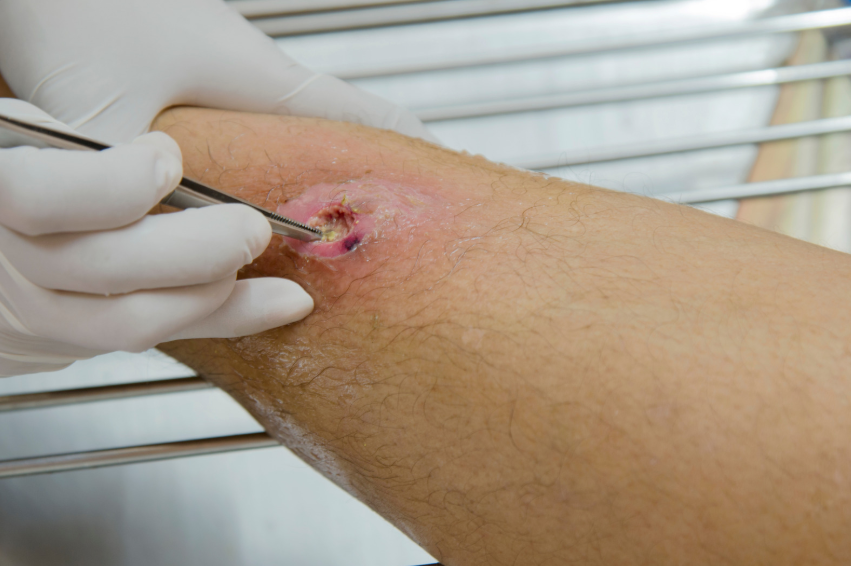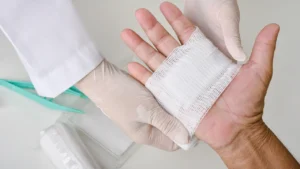Infected wounds are a common complication that can occur after surgeries or fractures, especially in orthopedic cases. The importance of recognizing the signs of infection early is critical to prevent further complications. Orthopedic treatment for infected wounds ensures proper care and healing, with a range of solutions that address infection from the root cause. In this blog, we’ll discuss how to spot the signs of infected wounds and how orthopedic care plays a vital role in treating these infections effectively.
What is an Infected Wound?
An infected wound occurs when harmful bacteria or pathogens enter the body through a break in the skin, leading to inflammation, pain, and potential complications. In orthopedic care, an infected wound can result from various procedures, including surgery or fractures that expose the underlying bone. Orthopedic treatment for infected wounds typically involves the careful evaluation of the wound’s severity and the selection of appropriate treatment methods to prevent the spread of infection.
Common Signs of Infected Wounds
Recognizing the signs of an infected wound is crucial for timely intervention and optimal recovery. Common symptoms include redness, swelling, warmth, increased pain, and the presence of pus or other discharges. In some cases, a fever or chills may occur. If the wound isn’t healing as expected or is getting worse, it may indicate an infection. Orthopedic treatment for infected wounds often focuses on managing these symptoms, utilizing both non-invasive and surgical methods to combat the infection and promote healing.
Causes of Wound Infections in Orthopedic Patients
Infections can happen after orthopedic surgeries or traumatic fractures, particularly when bone or tissue is exposed. Risk factors such as poor hygiene, chronic medical conditions (like diabetes), or an impaired immune system can increase the likelihood of infection. In these cases, orthopedic treatment for infected wounds is crucial to address not only the infection itself but also to evaluate any underlying health issues that might hinder the healing process. Identifying these causes early can help guide treatment and reduce infection risk.
The Importance of Early Detection and Treatment
The sooner an infection is detected, the more manageable it becomes. Delayed treatment can lead to severe complications, including deep tissue infections, sepsis, or bone infections (osteomyelitis). Early detection allows for targeted orthopedic treatment for infected wounds, including the use of antibiotics, wound care techniques, or, in more severe cases, surgical debridement. Prompt treatment can help ensure faster healing and reduce the risk of long-term damage.
How Orthopedic Care Helps in Treating Infected Wounds
Orthopedic treatment for infected wounds involves a multidisciplinary approach, including wound cleaning, debridement, and the administration of antibiotics to control the infection. In some cases, surgical intervention may be necessary to remove dead tissue or drain the wound. Orthopedic specialists are trained to manage infections that affect both soft tissue and bone, ensuring comprehensive care. Depending on the infection’s severity, this treatment may involve both conservative methods and more aggressive surgical procedures to restore health to the affected area.
Prevention of Infected Wounds in Orthopedic Patients
Preventing infections in orthopedic patients is crucial to ensure faster recovery and avoid additional complications. Proper wound care, including regular cleaning and dressing changes, is essential to reduce the risk of infection. Orthopedic treatment for infected wounds begins even before the infection sets in, as preventative care, like maintaining sterile conditions during surgery and closely monitoring post-surgical wounds, plays a key role. Patients should also be vigilant in following the healthcare provider’s instructions and keeping the wound clean and dry.
When to Seek Medical Help
If you notice any signs of an infected wound—such as persistent redness, swelling, or discharge—it’s important to seek medical attention immediately. Delaying treatment can lead to worsening symptoms or more severe infections that can impact the bones or surrounding tissues. Orthopedic treatment for infected wounds should be sought as soon as any concerning symptoms arise, to avoid complications and support a full recovery. Consulting with an orthopedic specialist ensures that any infection is addressed before it progresses further.
Takeaway
Infected wounds are a serious concern for anyone recovering from an orthopedic injury or surgery. Recognizing the early signs of infection and seeking timely orthopedic treatment for infected wounds can make a significant difference in recovery. With the right medical care, most infections can be managed effectively, allowing patients to return to their normal activities sooner. By staying vigilant and following proper wound care guidelines, you can prevent infections and ensure optimal healing during your recovery process.






